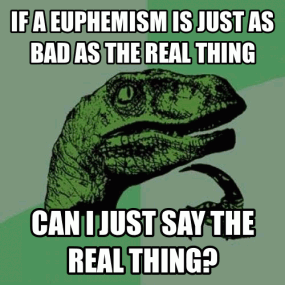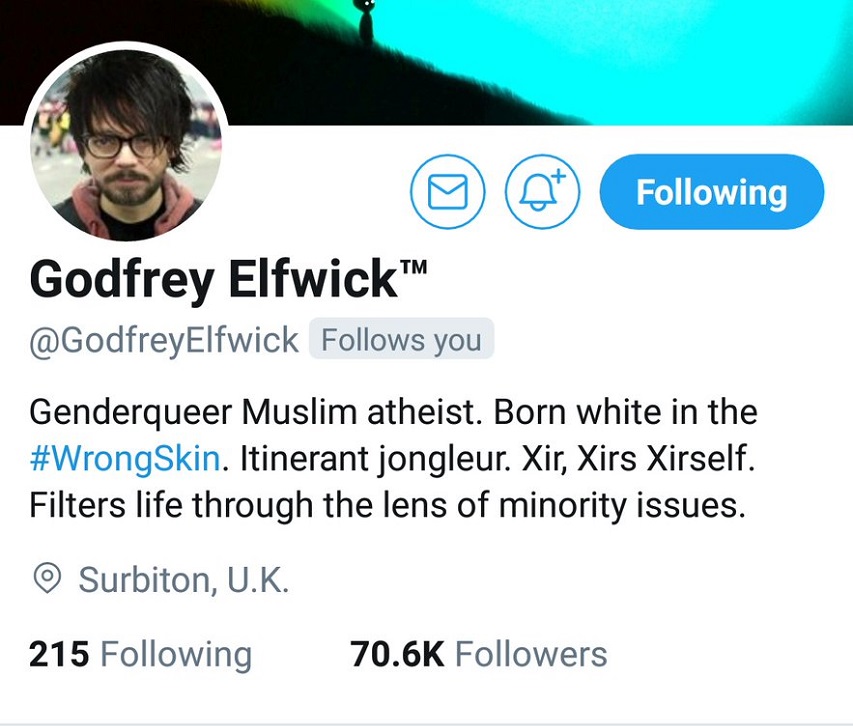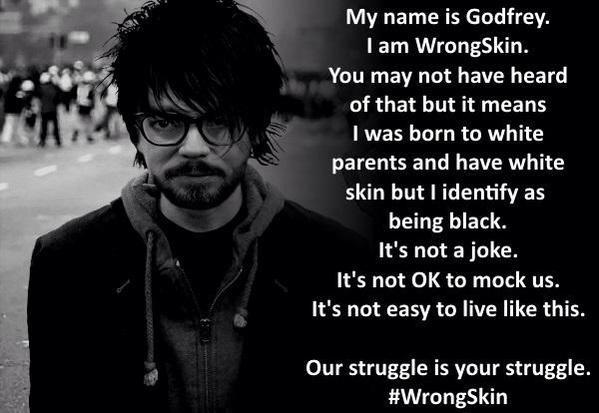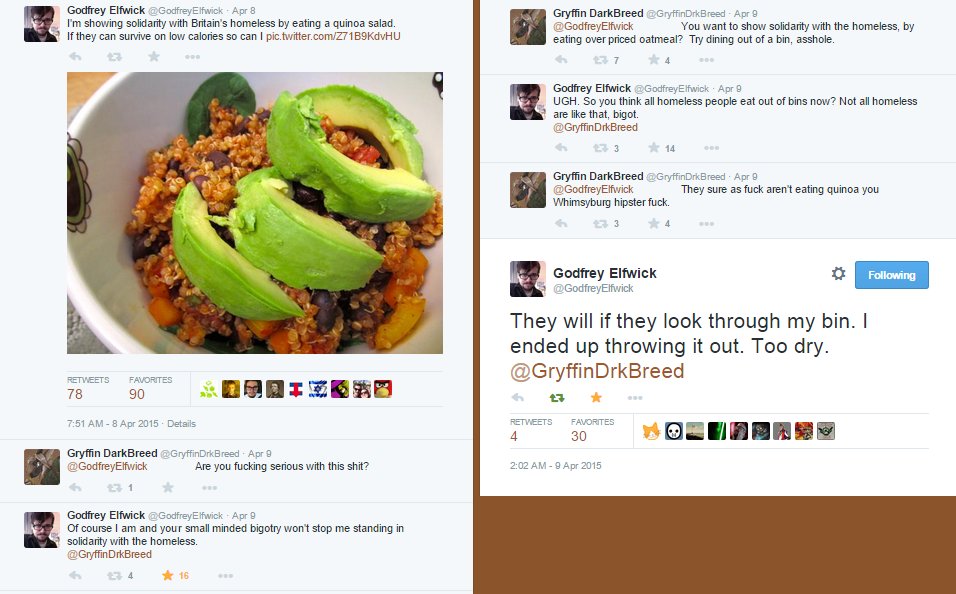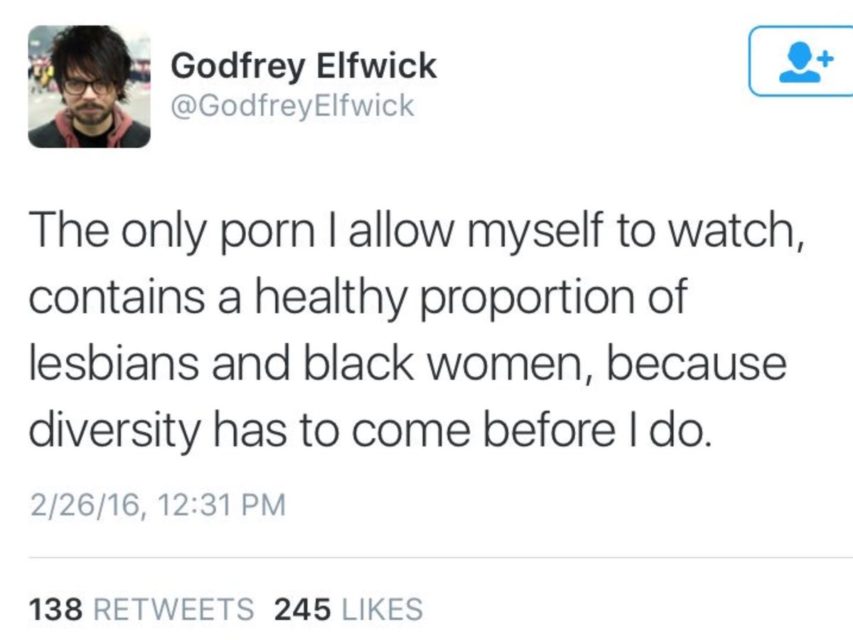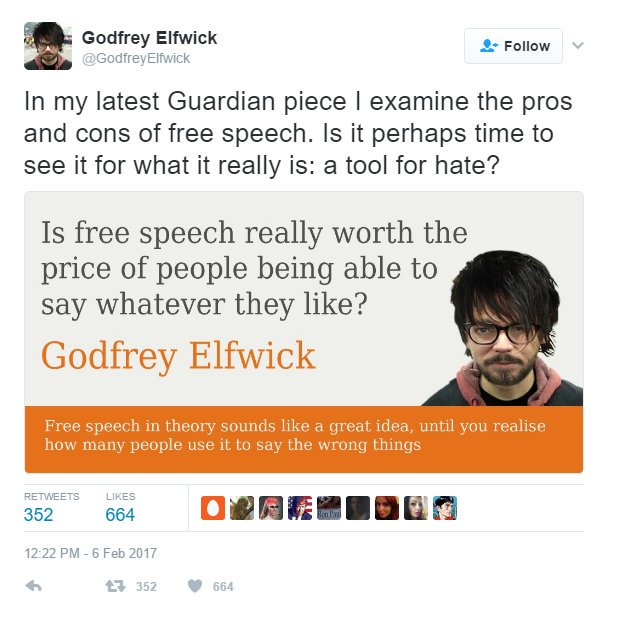… in the same manner that many white people who initially signed on to the whole “don’t be a racist” program because it seemed fair were eventually alienated by the escalating rhetoric of “justice won’t be achieved until the last evil melanoma-prone ice devil baby is smashed dead against a rock,” many men — and even women — who had no problem with ideas such as equal pay and female suffrage started to get grossly turned off by rhetoric and policies that viewed being born male as an original sin that demanded eternal punishment.
Even though black women live longer than white men in the USA … and even though women control more disposable wealth than men do … and even though women are snagging most of the college degrees these days … and even though the law and public sympathy heavily lean toward women in any dispute between the sexes … and even though the media portray men as either bumbling incompetents or bloodthirsty rape-monsters … and even though men are far more likely to commit suicide, die on the job, or be homeless than women … we’re still lectured by these bitter fat blobs and their testosterone-free male enablers that misandry isn’t real because men still benefit from certain mysterious “systemic” and “institutional” advantages that none of these assholes seem able to enumerate even when calmly asked to do so.
It’s a funny sort of “patriarchy” we inhabit.
To allege that women are capable of malice and violence and deception is only to allege that they’re human. To expect anything less of them would be dehumanizing and patronizing — which, ironically, shares a root word with “patriarchy.” When feminism ditched the “equity” rhetoric in favor of a menses-splattered pagan goddess religion that depicts men as irredeemable worker drones and women as innocent angels, men who weren’t entirely asleep or pussy-whipped realized that the rules had changed and that they were under attack. But even to notice that a lot of women openly exult in hating men gets you labeled a “woman-hater.”
Misandry is real, and those who seek to deny or justify it deserve a stern paddling. And even if you acknowledge that it’s real, don’t try to make excuses for it using some postmodern gobbledygook, because then you become a misandry apologist — a misandropologist. Just admit that women can be every bit as mean, nasty, horrid, foul, vile, shitty, and hateful as men. It’s part of the human condition.
Naïve as it may be, I envision an enlightened future where there is no longer any misogyny or misandry — only a beautiful, sweet, shared sense of misanthropy.
Jim Goad, “Confronting the Misandropologists”, Taki’s Magazine, 2017-05-08.
June 27, 2019
QotD: “Misandropologies”
June 13, 2019
QotD: Justice and Social Justice
It bears repeating: actual justice holds you responsible for the actions you take. “Social justice” holds you responsible for actions taken, without your knowledge or consent, by people you do not know and have never met. It’s guilt by association, and a perversion of true justice.
Sam Duncan, in a comment posted to “Elsewhere (234)”, DavidThompson, 2017-06-01.
May 11, 2019
The “Euphemism Treadmill”
An older post by Stan Hingston on the urgent need of many people to demand others use their chosen euphemisms, especially when the word objected to is itself already a euphemism:
Stephen Pinker in his 2003 book The Blank Slate coined the name euphemism treadmill for the process whereby words introduced to replace an offensive word, over time become offensive themselves. A current example of this is mental retardation.
The word itself comes from the Latin retardare meaning “to make slow, delay or hinder”.
Retardation was first used in the psychiatric sense in 1895, and eventually replaced older terms – once neutral themselves – like moron, imbecile, idiot, feeble-minded and cretin. Each of these terms had a specific meaning as to severity and age of development (cretinism for example referred to severe congenital hypothyroidism) but these meanings often differed between countries. The new term was subdivided into degrees of mild, moderate and severe mental retardation. These new technical terms were no doubt welcomed by those affected, as the previous names were being used as derogatory insults (as indeed they still are).
By the 1960s when I was in grade school, the same process had occurred with retardation. “Retard” was a common playground insult, as in “Look where yer goin’, ya retard!” To us at the time it was considered harmless fun (although I now recognize the potential to really hurt someone who did have an intellectual disability). In Grade 7 my buddy Doug and I did impersonations of “retarded chipmunks” in which we tucked our lower lip inside our upper front teeth and crossed our eyes.
Since that time retardation has been gradually replaced by a variety of more acceptable (at least for now) terms including mentally handicapped, mentally impaired, mentally challenged, intellectually challenged, intellectually disabled, learning disabled, and developmentally disabled. The last two of course are broader terms that include other conditions not covered by the meaning of mental retardation.
The problem of technically defined terms being appropriated by “the masses” and misused is not soluble by professional bodies, and given the flexibility of the English language, probably not even by a French-style “official language commission” empowered with all the majesty of law: it would be a massive waste of time and effort. Of course, “massive waste of time and effort” is pretty much baked into the bones of government agencies…
February 27, 2019
Transgender athletes
Barbara Kay explains why she is against allowing transgender athletes to compete with cisgendered women:
Sport is one area where the community will resist “social justice” initiatives if they conflict with sport’s bedrock principles of a level playing field and zero tolerance for cheating. Up until about five minutes ago in the long history of sport, that meant women competed against women and men competed against men in all sports where advantage lies in size, power and/or speed.
When a biologically male runner or cyclist who ranks as middle of the pack in men’s races becomes the gold medallist in a Women’s race, he cheats the silver and bronze women athletes beside him on the podium, and especially the woman who came in fourth. But he also cheats people who came out to see a clean race. Joe and Jane Public know unfairness and reality denial when they see it, and it sucks all the joy out of the word “competition” for them.
[…]
Athlete Ally is one of a constellation of LGBT advocacy groups that “are helping sport organizations in Canada become more inclusive.” This quotation is taken from the Canadian Centre for Ethics in Sport’s most recent policy paper, “Creating Inclusive environments for Trans Participants in Canadian Sport.” Designed as a policy guidance tool for sport organizations, it was developed by the ‘Trans Inclusion in Sport Expert Working Group,’ which I will hereafter refer to as the EWG. If you want to get a flavour of the kind of anti-science Kool-Aid our sports brain trust is drinking, read this document.
It begins factually enough. The paper notes that the vast majority of sport participation in Canada is focused on recreation and development. At this level, trans inclusion is not a big deal, because it’s all about fun and skill building. It is only for the “very small minority” of Canadian athletes who continue into high performance that competitive advantage becomes an issue. Enter the EWG. And here we leave facts behind and enter La La Land.
Sex, the EWG says, “is usually assigned at birth.” No. Sex is established during gestation according to chromosomal development. Sex is observed at birth, not assigned. Gender, the EWG says, “is not inherently connected to one’s physical anatomy.” No. Sex and gender are connected for 99% of humanity, and therefore “inherent” by normal metrics.
The definition of the word “trans,” for sports purposes, according to the EWG, “includes but is not limited to people who identify as transgender, transsexual, cross dressers (adjective) or gender non-conforming (gender diverse or genderqueer).” This is quite a puzzling mashup. Cross-dressing males do not believe they “are” female. Neither do non-conforming males and females who have no wish to transition.
But the document does not address this important inconsistency, nor the alarming imprecision of “not limited to.” From what they state in this definition, EWG is okay with cross-sex competing by biological males who do not believe they are females and females who do not believe they are male, but whose appearance or fetishes are atypical for their sex. We’re off to a very confusing start. Things don’t improve.
Indeed, to be trans can mean almost anything an individual wants it to mean (“not limited to…”), according to this document: “It is important for sports organizations to understand that each individual is different. There is no single transition process and each person will make different choices,” including, significantly, “whether they undertake hormonal or surgical transitions.”
And “[a]n individuals’ personal choice to not use hormones does not make them any less trans nor do these choices change their right to be recognized as the gender with which they identify — man, woman, both or other.” In short, the definition of trans, to be accepted by official governing sports bodies, is left entirely to an individual’s “sense” of gender identity, completely untethered from biology.
February 3, 2019
QotD: The core of the social justice warrior spirit
There is a difference between the spirit and the intellectual content, of course, but the two are intimately connected. A core belief is that ideas and words define the cultural narrative and so create the society itself. This is meant in the most literal sense possible; they do not influence society, they *create* the society in which everyone lives.
Thus ideas and words cease to be individual expressions of people who may differ in beliefs and then peacefully go their own ways. The personal becomes political. Because ideas and words create society they must be controlled in order to establish a proper ones. Ideas that go in the opposite direction become acts of oppression in and of themselves because they are responsible for injustice which SJWs see everywhere. “Incorrect” ideas and words must be eliminated, sometimes with intimidation and open censorship, at other time with the encouragement of “correct” views such as the massive funding of PC within academia.
This explains why SJWs consider dissenting words, ideas and consciences to be not only their business but also violence. To censor and control the minds and mouths of others becomes an act of self-defense and defense of the marginalized. Their absolute commitment to a hyper-narrow vision of justice makes them fanatical about controlling heretics, down to the use of words such as “he” or “she.” SJWs become willing to commit brutal cruelty and (sometimes) even violence against the heretic who is hated. After all, his disagreement with the “true God” is an act of violence against them.
Wendy McElroy, interviewed by Joseph Ford Cotto, “Wendy McElroy explains why ‘SJWs become willing to commit brutal cruelty’ toward ‘the heretic who is hated'”, San Francisco Review of Books, 2017-02-15.
January 24, 2019
QotD: Multiple gender identities
A few examples of possible gender identities offered in Crofton’s article include “amorgender,” which is “gender that changes in response to a romantic partners,” “mirrorgender,” which is “gender that changes to reflect those around you,” “chaosgender,” which is “gender that is highly unpredictable,” and “gendervex,” which is “having multiple genders, each of which is unidentifiable.” Genders can also be negative instead of positive — something Crofton calls “antigender.” For example, some people might identify as “antigirl,” and that’s not to be confused with identifying as “male.”
Now, lest you think that all of this sounds too simple and restrictive, Crofton also clarifies that your gender absolutely does not have to be something that’s included on this or any list, because even though “dominant culture wants us each to conform to a single gender,” you are totally allowed to have as many genders as you want, to change your gender or genders as often as you want, and to identify as a certain gender or genders like only a little bit instead of completely. Basically, anything goes — except, of course, for cultural appropriation.
Yes, that’s right. According to Crofton, certain gender identities can be appropriation, such as “the Two-Spirit genders of some North American Indigenous groups” and “autigender and fascigender, which are exclusive to people with autism.”
“Because it’s impossible to access these genders without being part of a specific cultural context, it’s inappropriate for outsiders to claim any Two-Spirit gender,” Crofton writes, adding that if even one of your genders is “culturally appropriated,” then your whole “overarching identity also becomes problematic” — a situation that can be an issue for “pangender people.”
“Pangender people, in a literal sense, identify as all genders,” Crofton writes. “The problem is that ‘all genders’ includes culturally specific genders that must not be appropriated.”
Ahhhhhhh, yes. A huge problem indeed! I, for one, cannot believe there hasn’t been more talk about how “pangender” is, by definition, culturally insensitive, and that identifying as all genders inherently means that you’re saying that you identify with at least one gender outside of your own cultural experience. The solution, according to Crofton, is for pangender people to make sure that they describe themselves as being “all available genders” instead of as “all genders.”
Katherine Timpf, “SJW Internet Publishes a Guide to Being as Many Genders as You Want without Culturally Appropriating”, National Review 2017-02-13.
October 14, 2018
NPCs belong in video games or Dungeons & Dragons campaigns, not in the real world
Brandon Morse on a term that’s migrated out of its original gaming context and being used as a label for social justice warriors:
If you’ve ever picked up a video game that features other characters that are controlled by the computer, then you’ve run into non-player characters or NPC’s.
NPC’s serve a host of different functions depending on what the program you’re playing with needs them for. They’re the villagers in Skyrim, Toad from Super Mario Brothers, and the ghosts in Pac-Man. NPC’s may have dialogue, patterns, and personality, but at the end of the day, they’re just a program with pre-set behavioral patterns decided for them by a developer.Now let’s pretend we’re taking this article from the top…
If you’ve ever stepped onto a college campus or a protest demonstration that features people with neon colored hair screaming at the top of their lungs about identity politics or a social concern then you’ve run into a social justice warrior or SJW.
SJWs serve a host of different functions depending on what activists, politicians and the media need them for. They’re the crazed people trying to beat down the Supreme Court door, the Antifa members threatening motorists, or the male-feminist roundhousing a woman for expressing pro-life views. SJW’s may have dialogue, patterns, and personality, but at the end of the day, they’re just a program with pre-set behavioral patterns decided for them by professors, activist groups, or the media.
The comparison between NPC’s and SJW’s is pretty striking and simultaneously hilarious.
H/T to David Thompson for the link.
September 22, 2018
“This is the religion of Wokeness, and this is the era of the Great Awokening”
Have you heard the word of Social Justice? Social Justice can save you, you know:
From the sun-blanched beaches of California to the snow-covered cities of New England, a religious fervor is sweeping the United States. PhD-toting preachers spread the faith with righteous zeal, denouncing those who violate its sacred principles. Sinners are threatened not by an angry god, but by a righteous mob. The impenitent among them are condemned to be outcasts, while the contrite, if they properly mortify themselves and pledge everlasting fealty to the faith, can secure enough lost status to rejoin society, perhaps forever marked by a scarlet epithet. Racist. Sexist. Ableist. This is the religion of Wokeness, and this is the era of the Great Awokening.
In the following article, we will explore this quasi-religion, Wokeness, as a status system that functions predominantly to distinguish white elites from the white masses (whom we will call hoi polloi). It does this by offering a rich signalling vocabulary for traits and possessions such as education, intelligence, openness, leisure, wealth, and cosmopolitanism, all of which educated elites value (for a similar analysis, see Rehain Selam’s August essay in the Atlantic, discussed by David French in the National Review article linked above). From this perspective, the preachers of the Great Awokening — those who most ardently and eloquently articulate the principles of Wokeness — obtain status because they (a) signal the possession of desired traits and (b) promulgate a powerful narrative that legitimizes the status disparity between white elites and hoi polloi. The elites, according to these preachers, are morally righteous and therefore deserve status, whereas hoi polloi are morally backward and deserve obloquy and derision.
It’s important to note before we begin that this perspective does not contend that all the actors in this status system are cynical charlatans. In fact, it insists that many legitimately believe their assertions about pervasive racism, sexism, transphobia, et cetera, and feel compelled to preach their doctrine so as to make society more just. Sincere belief and status motives often conspire. For example, the famous preachers of the Great Awakening (from whom we derived our title) almost certainly believed the urgency of their message and the elaborate metaphysics of their faith, but also obtained status from their books and sermons.
Wokeness
Before analyzing Wokeness as a status system, we must understand it as a quasi-religious doctrine. Unlike scientific theories or other empirical claims, the basic tenets of Wokeness are held with sacred fervor. Those who challenge them are not debated; rather, their motives are denounced, and they are cast out of polite society like heretics. To take just one example, when someone objects to the Woke principle that “diversity is a strength,” committed believers rarely greet the objection as an opportunity for argument. Instead, they attack the apostate for his sacrilege, and accuse him of unspeakable moral treachery (see table below for other examples).
September 7, 2018
A model modern university syllabus
Philip Carl Salzman outlines what the modern university strives to impart to students:
Universities in the 20th century were dedicated to the advancement of knowledge. Scholarship and research were pursued, and diverse opinions were exchanged and argued in the “marketplace of ideas.”
This is no longer the case. Particularly in the social sciences, humanities, education, social work, and law, a single political ideology has replaced scholarship and research, because the ideology presents fixed answers to all questions. And, although the most important thing in universities today is the diversity of race, gender, sexual practice, ethnicity, economic class, and physical and mental capability, there is no longer diversity of opinion. Only those committed to the ideology are admitted to academic staff or administration.
Universities have been transformed by the near-universal adoption of three interrelated theories: postmodernism, postcolonialism, and social justice. These theories and their implications will be explored here.
The courses may not be as transparently labelled as Salzman says, but the content will be remarkably similar:
Postmodernism: In the past, academics were trained to seek truth. Today, academics deny that there is such a thing as objective Truth. Instead, they argue that no one can be objective, that everyone is inevitably subjective, and consequently everyone has their own truth. The correct point of view, they urge, is relativism. This means not only that truth is relative to the subjectivity of each individual, but also that ethics and morality are relative to the individual and the culture, so there is no such thing as Good and Evil, or even Right and Wrong. So too with the ways of knowing; your children will learn that there is no objective basis for preferring chemistry over alchemy, astronomy over astrology, or medical doctors over witch doctors. They will learn that facts do not exist; only interpretations do.
[…]
Postcolonialism, the dominant theory in the social sciences today, is inspired by the Marxist-Leninist theory of imperialism, in which the conflict between the capitalist and proletariat classes is allegedly exported to the exploitation of colonized countries. By this means, the theory goes, oppression and poverty take place in colonies instead of in relation to the metropolitan working class. Postcolonialism posits that all of the problems in societies around the world today are the result of the relatively short Western imperial dominance and colonization. For example, British imperialism is blamed for what are in fact indigenous cultures, such as the South Asian caste system and the African tribal system. So too, problems of backwardness and corruption in countries once, decades ago, colonies continue to be blamed on past Western imperialism. The West is thus the continuing focus on anti-imperialist and anti-colonialist sentiment. Your children will learn that our society is evil, and the cause of all the evil in the wider world.
[…]
Social justice theory teaches that the world is divided between oppressors and victims. Some categories of people are oppressors and other are victims: males are oppressors, and females are victims; whites are oppressors, and people of color are victims; heterosexuals are oppressors, and gays, lesbians, bisexual, etc. are victims; Christians and Jews are oppressors, and Muslims are victims. Your sons will learn that they are stigmatized by their toxic masculinity.
[…]
“intersectionality” is an idea invented by a feminist law professor. It argues that some individuals fall into several victim categories, for example, black, female lesbians have three points in the victim stakes, as opposed to male members of the First Nations who receive only one point. Further, on the action front, members of each victim category are urged to unite and ally with members of other victim categories, because sharing the victim designation is the most important status in the world. This leads to some anomalies. Black victims of racism are urged to unite with Arab victims of colonialism, even though Arabs have been and still are holders of black slaves.
Female victims of sexism are urged to support Palestinian victims of “white” colonialism, even though Palestinian women have always been and continue to be subordinated to men, and are subjected to a wide range of abuse. Your children will learn that to be accepted, they must assume victim status or become champions of victims, and ally with other victims.
July 26, 2018
The life and strange death of Godfrey Elfwick
Poor old Godfrey has been taken from us by the Grim Twit-Reaper, felled in his Xirs prime in the midst of Twitter’s most recent mass-banning. At Spiked, Andrew Doyle pays tribute to the late Arch-Ubertroll of social media:
In November 2016, the Guardian published a comment piece in which the anonymous writer described how he was radicalised into the ‘alt-right’. It started when he watched a few ostensibly harmless videos by the American liberal Sam Harris. From there, he graduated to material of an anti-SJW (Social Justice Warrior) and anti-feminist disposition, before eventually becoming a fan of the dreaded Milo Yiannopoulos. As the writer dramatically put it: ‘The indoctrination was complete.’
Soon after, a well-known Twitter troll called Godfrey Elfwick claimed to be the author. It made complete sense, even though it wasn’t true. Elfwick was a brilliant caricature of the excesses of the liberal-left. He, or rather xe, identified as a ‘genderqueer Muslim atheist’ who was ‘born white in the #WrongSkin’. His ‘transblack’ status began as a satire of Rachel Dolezal, the US civil-rights activist who was born to white parents but identifies as black. ‘I have light skin’, he tweeted, ‘yet I know in my heart I am black and act accordingly’. Elfwick’s #WrongSkin hashtag soon began to trend worldwide on Twitter, fooling many in the process. Even the Mirror and the BBC published articles which did not rule out the possibility that the campaign might be authentic.
Similarly, Elfwick’s claim to have penned the Guardian comment piece was effective precisely because it was so feasible. The satire was double-edged. On the one hand, Elfwick had accentuated the inherent absurdities of the article in question, exposing the self-parodic nature of the Guardian. On the other, he had successfully duped public figures such as Sam Harris, Maajid Nawaz, and leading Gamergater Ethan Ralph, all of whom had been so quick to take his tweets at face value. The hoax claim was in itself a hoax.
Elfwick’s brand of satire depended on this kind of ambiguity. Those who took his posts seriously were inadvertently enhancing the impact of the joke, especially when they expressed such boiling outrage. It is no coincidence that objections to Elfwick tend to come from po-faced peddlers of identity politics who are unhappy about being ridiculed. The same goes for the ideologues of Twitter, who have an established record of deleting accounts for political reasons and have now permanently banned Elfwick from their platform.
A few gems from the Trolling Hall of Fame:
July 14, 2018
QotD: Ridiculous criteria for reporters
The idea that you must be a part of a demographic to write about it is contrary to the very nature of reporting: The job of the reporter is to listen to and relay other people’s stories, but it’s also to look for evidence, to dig into claims, to get at the truth. If you want all your stories to come directly from the source’s mouth, enjoy getting all of your news from social media. Besides, if people only wrote about populations they fit in, that would mean that I’m only allowed to write about 35-year-old lesbians from North Carolina and Jesse is only allowed to write about Boston Jews who love the Celtics and, sorry trans writers, but no more cis stories for you. Hope you don’t want to cover politics. According to this logic, the White House press corps would have to be made up of 70-year-old men with giant egos and tiny brains. Anyone writing about immigrant children separated from their families in Texas would have to be an immigrant child separated from their family in Texas. If that’s what people want, okay, but good luck effecting any sort of political change in a media ecosystem like that. You can’t argue for visibility and then claim that no one is allowed to write your stories but you.
Katie Herzog, “Twitter, Trans Kids, Call-Out Culture, and a $10,000 Blunt”, The Stranger, 2018-06-19.
May 11, 2018
The impact of universities on Generation X
Last month, Aaron Clarey explained why (in his view) the 1980s were so much better than the 1990s:
For example if you went to the gas station you would buy gas there. If you went to Target you bought staples and everyday supplies. If you went to the coffee store they would serve you coffee. And if you went to a movie theater they would show you a movie. They were simpler times and it made my halcyon childhood days very enjoyable. But then something started happening in the 90’s that would end these blissful, innocent times.
College.
Well, not college unto itself necessarily, but the propaganda…err..umm… “education” my generation (Gen X) would receive in college. For you see, while we were all told we “had to go to college” because it was necessary for us to have any sort of career or professional life at all, at the same time some very conscious and very intentional people in academia had a political agenda. And it was to make sure that we not so much had skills that would land us jobs in the future, but more importantly (to them anyway) that we placed more value on social and political agendas than profit, production, efficiency and reality. So that by the time Gen X graduated from college, and inevitably started taking over the reigns of control of the economy (which we have), we would not be so much concerned with offering the best product at the best prices possible, but what I like to call “Profit Plus Purpose.”
Politics Politics Everywhere! In Your Soup and in Your Hair!
You see this “Profits Plus Purpose” every day in western economies. It is literally unavoidable. If you go to a hotel there is always a sign asking you to “save the planet” by reusing your towels. If you go to a coffee store they cannot help themselves from bragging about their organicfairtradefreetradegaiaunicorn credentials. When you walk into a Target they’re always bragging about how they give back 5% to the community. Even British Petroleum tells you about how environmentally friendly they are at their gas pumps, while Exxon Mobil actually has a “corporate social responsibility page.” Matter of fact, this propaganda is so thorough and so complete Generation Z will be the first generation to be brought up where there has ALWAYS been some kind of secondary political message forcefully embedded into nearly every product and service sold in America.
The reason “Profits Plus Purpose” propaganda was so COMPLETE and UNIVERSALLY successful can be found in its genius genesis. It capitalizes on the egotistical and lazy nature of human beings. Leftist academics and politicians started propagandizing Generation X in college with the beginnings of things like “diversity,” “feminism,” “environmentalism,” “global warming,” etc. (you could almost pinpoint it to the date Captain Planet first aired). Whether you believe in the veracity of these “isms” or not is moot, because their ulterior purpose was to give then-naïve-and-egotistical Gen X’ers immediate gratification, purpose, morality, and ego in exchange for their life-long leftist political loyalty and further advancing said political agendas well into the future.
Why, you weren’t just some rank and file Mechanical Engineering major. You were an environmentalist Mechanical Engineering major.
Why, you weren’t some mass produced business major. You were an empowered, feminist, future business leader.
You weren’t some worthless, math-avoidant liberal arts degree major. You were a pro-refugee activist utterly unemployable liberal arts degree major.
Thus, whereas learning a real skill from a real degree took deterring work, effort, and rigor, immediately subscribing to some kind of moral leftist political crusade was effortless, yet provided immediate value and agency. Gen X couldn’t sign up fast enough and thus virtue signaling and Social Justice Warriors were born.
H/T to SDA for the link.
May 6, 2018
Now I understand why Google calls it a “campus”
I’ve worked in high tech for my entire career, and I’ve never worked at a company that had anything like this kind of non-work-related activity … it sounds much more like a university than a workplace (and I don’t mean that in a positive way):
A recent report in The Wall Street Journal chronicles the drama of a thoroughly politicized and tribal workplace at Google, where activist employee groups stage competing talks on their pet issues, and a growing number of former employees are suing the company for discrimination and bias.
The article opens with an incident that took place in January, when Ingrid Newkirk, the co-founder and president of People for the Ethical Treatment of Animals, was slated to give a presentation at the company’s Silicon Valley headquarters as part of the “Talks at Google” series.
The subject of her talk, which was organized by the “Googlers for Animals” employee group, was how animals can be subject to discrimination and bias just like people are. But another employee group, the “Black Googler Network,” understandably found the premise of the talk offensive and protested it. The talk was canceled at the last minute, as Newkirk was waiting in a parking lot outside Google.
“Such is the climate inside the tech giant, where fractious groups of employees have turned the workplace into a virtual war zone of debate over all manner of social and political beliefs,” wrote the Journal. “Google has long promoted a work culture that is more like a college campus—where loud debates and doctrinaire stances are commonplace—and today its parent, Alphabet Inc., is increasingly struggling to keep things under control.”
Welcome to Google, microcosm of America in 2018. Like nearly every facet of American life these days, Google’s workplace has become politicized, which means the company must now constantly adjudicate every offense that arises from an ever-growing roll call of the aggrieved.
Google reportedly has employee groups for every conceivable cause: “Activists at Google,” which is anti-Trump; “Militia at Google,” which is pushing for the ability to carry guns in the office; “Conservatives at Google,” which claims the company discriminates against right-leaning job candidates; and “Sex Positive at Google,” which doesn’t want explicit content removed from Google Drive file-sharing software. Like other tech companies, Google has cultivated a college atmosphere in the workplace. It seems the company has succeeded, but only in the sense that its workplace has fractured into competing identity groups.
How would anyone get any actual work done with all those competing circus acts clamouring for attention throughout the “work”day?
March 26, 2018
QotD: Virtue signalling
It’s noticeable how often virtue signalling consists of saying you hate things. It is camouflage. The emphasis on hate distracts from the fact you are really saying how good you are. If you were frank and said, ‘I care about the environment more than most people do’ or ‘I care about the poor more than others’, your vanity and self-aggrandisement would be obvious, as it is with Whole Foods. Anger and outrage disguise your boastfulness.
One of the occasions when expressions of hate are not used is when people say they are passionate believers in the NHS. Note the use of the word ‘belief’. This is to shift the issue away from evidence about which healthcare system results in the greatest benefit for the greatest number of people. The speaker does not want to get into facts or evidence. He or she wishes to demonstrate kindness — the desire that all people, notably the poor, should have access to ‘the best’ healthcare. The virtue lies in the wish. But hatred waits in reserve even with the NHS. ‘The Tories want to privatise the NHS!’ you assert angrily. Gosh, you must be virtuous to be so cross!
Comedians make use of virtue signalling of the vituperative kind. With the right audience they can get laughs scorning the usual suspects: Ukip, the Daily Mail, Eton, bankers and the rest. The audience enjoys the caricaturing of all of these, sneering at them and, in the process, joining together as a congregation of the righteously contemptuous. What a delight to display your virtue, feel confirmed in your views, enjoy a sense of community, let off some anger and have a laugh all at the same time! It is so easy, too!
No one actually has to do anything. Virtue comes from mere words or even from silently held beliefs. There was a time in the distant past when people thought you could only be virtuous by doing things: by helping the blind man across the road; looking after your elderly parents instead of dumping them in a home; staying in a not-wholly-perfect marriage for the sake of the children. These things involve effort and self-sacrifice. That sounds hard! Much more convenient to achieve virtue by expressing hatred of those who think the health service could be improved by introducing competition.
James Bartholemew “The awful rise of ‘virtue signalling’: Want to be virtuous? Saying the right things violently on Twitter is much easier than real kindness”, The Spectator, 2015-04-18.
March 15, 2018
Tip-toe around topics so as to avoid “triggering” someone
Matthew Blackwell isn’t alone in finding it necessary to avoid certain topics of conversation when talking with his friends on the left:
Outbursts of emotional hostility from progressive activists – now described as Social Justice Warriors or SJWs – have come to be known as getting ‘triggered.’ This term originally applied to sufferers of Post-Traumatic Stress Disorder, but activists have adopted it to describe the anxiety and discomfort they experience when they are exposed to views with which they disagree. “Fuck free speech!” one group of social justice advocates recently told Vice Media, as if this justified the growing belief among university students that conservatives should be prevented from speaking on college campuses. It’s no secret that, with the rise of the triggered progressive, university professors are increasingly intimidated by their own students. An illustrative example of this alarming trend was provided by the hordes of screaming students who surrounded the distinguished Yale sociologist Nicholas Christakis and demanded his head (which they duly received). Christakis had made the mistake of defending an email his wife had written gently criticizing Yale’s attempts to regulate students’ Halloween costumes. “Who the fuck hired you?!” screamed one irate student in response. “You should step down!”
This sort of my-way-or-the-highway mentality is now spreading well beyond the urban university and into even remote communities. In the small Outback Australian town of Alice Springs where I once lived, agitators have attacked and attempted to silence the local aboriginal town councillor Jacinta Price for her principled efforts to improve the lives of her people. When Price tried to sound the alarm about skyrocketing sexually transmitted diseases, or the adult rape of children in aboriginal communities, she was shouted down as a ‘traitor’ and a ‘coconut’ (a term of disparagement used to describe a person deemed to be black on the outside and white on the inside). These criticisms do not come from the majority of aboriginal people in Alice Springs, but from a minority of furiously offended activists who, in their own little circles, plot to have Price undemocratically removed from the town council. Censorship is now the instrument of choice, and a reactionary authoritarianism increasingly defines what the liberal Muslim activist Maajid Nawaz has termed the ‘Regressive Left.’
So how and why have these activists become so intolerant and horrible to deal with? Part of this hostility can be explained by a wilful ignorance and incuriosity about ideas with which they disagree. Every so often, a progressive friend will peruse my bookshelf in a thought-police sort of fashion. What happens next is fairly predictable. Once they realize that Malinowski’s Melanesian epic The Sexual Life of Savages doesn’t include any erotic pictures, they will turn their attention to the Ayn Rand collection. “Why do you have these?” they ask with an air of indignation, holding up a copy of Capitalism: The Unknown Ideal. “Have you ever read her?” I will ask. “No,” they reliably respond.
The liberal philosopher John Stuart Mill once explained that, “The greatest orator, save one, of antiquity, has left it on record that he always studied his adversary’s case with as great, if not with still greater, intensity than even his own.” Mill held that unless we carefully study the views of those with whom we disagree, we will never really know what they’re right or wrong about. “He who knows only his own side of the case,” Mill wrote in his 1859 book On Liberty, “knows little of that.” Our opponents could be right for all we know or care, because they may know a fact or offer an argument we’ve never thought to consider. And even if they aren’t right, Mill points out that specks of truth may exist among their falsehoods which can guide our minds in new directions.

